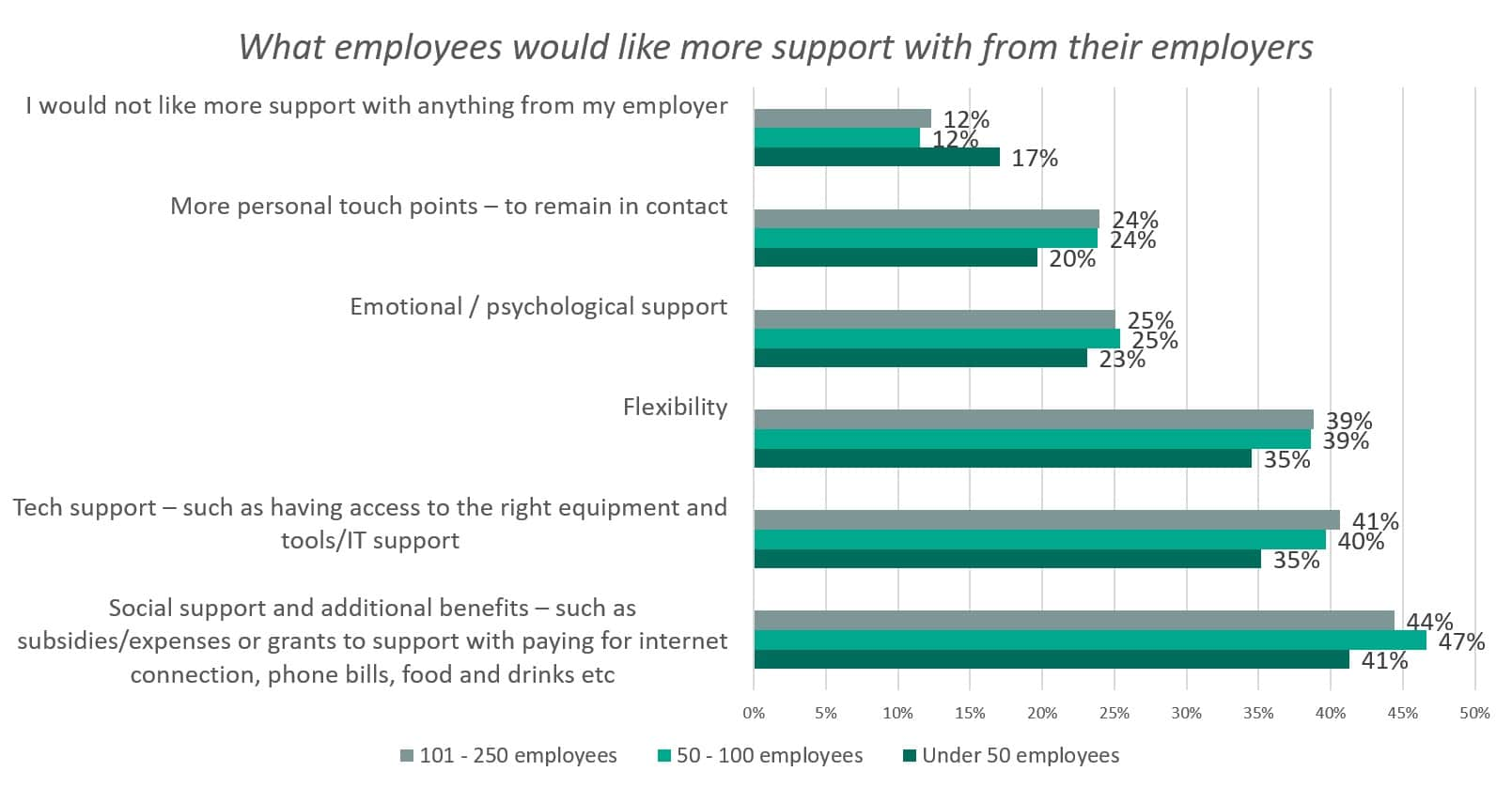According to a recent Kaspersky survey, people who work in companies with fewer than 50 employees, on average, need less employer support when working remotely, compared to staff in larger businesses.
According to a recent Kaspersky survey[1], people who work in companies with fewer than 50 employees, on average, need less employer support when working remotely, compared to staff in larger businesses[2]. Emotional or psychological support is an exception.
The COVID-19 pandemic has affected many companies, but small businesses have suffered more than others. According to numerous research findings, in some countries, up to 90% of small companies have experienced a negative impact from the pandemic, such as drops in production, sales and revenues, and even complete closures. In companies with a dozen or fewer people, the way employees get through these challenges can very much impact the state of the entire business. Therefore, it is important for leaders to monitor how employees feel and supervise the consequences that this can have on their business.
Kaspersky’s latest survey revealed that the largest gap in support expectations is seen in social aid and additional benefits, such as covering internet or phone bills. 41% of small company employees would like more support with this, in comparison to 47% among those working in medium-sized businesses. The same pattern is true for required technology support, like helping to provide the right equipment and IT tools (35% compared to 41%). This may be due to the fact that it is more common for people in small organizations to arrange their own working environment, use personal devices for work and take care of access to work services.
Emotional or psychological support is needed to almost the same extent for all businesses: 23% across small organizations and 25% across bigger ones. The impact of COVID-19 has not only affected people’s work and daily lives but has also caused anxiety for their own health and that of their loved ones, as well as overall optimism for the future. So, mental health support may be significant for any employee.

Chart 1: What form of support employees would like to have more of from their employers
“People who have experience working in small businesses may feel more self-sufficient in the new working reality and this has helped their organization to concentrate all of their resources on survival. However, to maintain employee productivity and moral, it is still important to make sure that staff have all that they need for work. When it comes to their technology set up, employees need help to use IT securely even if working on personal laptops and managing access to all web services alone,” comments Ivan Salikhov, Product Manager, SMB Products at Kaspersky.
To facilitate remote working conditions for employees, Kaspersky recommends the following actions:
- Open and honest communication is crucial for employees, as they seek cues from their managers on how to react to crisis situations. Organize ‘Ask Me Anything’ sessions with the company’s top management so that they can talk to employees about how your business will continue working in the new circumstances.
- Run surveys to understand the emotional state of your employees, their workload, if they have everything they need for remote working, and if they have clarity on the business processes. This gives a better understanding about specific circumstances people are in today and helps to make more balanced decisions.
- Help your employees manage information overload and the feeling of being overwhelmed at this uncertain time. Keep your teams informed of the facts and current situation, as well as on how to stay safe and healthy.
- Create HR and IT online communication channels so that everyone can easily solve their issues. Provide guidance for all employees on how to enable remote working and use certain software. It can be done through webinars or group calls.
- Educate employees to use basic security practices when working remotely, such as how to avoid becoming a victim of email or web phishing, or how to manage accounts and passwords. Kaspersky and Area9 Lyceum have created a free course to help staff work safely from home.
- Adopt a cloud-based security solution. Even small companies should protect themselves from cyberthreats, regardless of whether employees work on corporate or personal devices. Kaspersky Small Office Security can be installed remotely and managed from the cloud; it doesn’t require much time, resources or specific knowledge for deployment and management.
The full report, ‘Securing the Future of Work’, can be found here.
About Kaspersky
Kaspersky is a global cybersecurity company founded in 1997. Kaspersky’s deep threat intelligence and security expertise is constantly transforming into innovative security solutions and services to protect businesses, critical infrastructure, governments and consumers around the globe. The company’s comprehensive security portfolio includes leading endpoint protection and a number of specialized security solutions and services to fight sophisticated and evolving digital threats. Over 400 million users are protected by Kaspersky technologies and we help 250,000 corporate clients protect what matters most to them. Learn more at www.kaspersky.com.
[1] Kaspersky commissioned independent research firm Censuswide to conduct a survey of 8,076 employees of small-to-medium businesses (10 – 250 employees) in Brazil, Belgium, China, France, Germany, Italy, Japan, Luxembourg, Malaysia, Mexico, Netherlands, Russia, Spain, South Africa, Turkey, UAE, the UK, and the USA in October 2020.
[2] This small and medium sized business (SMB) segment includes companies with 50 – 100 and 101 – 250 employees.




